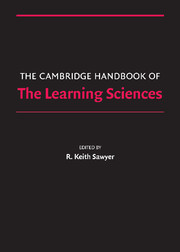Book contents
- Frontmatter
- Contents
- Preface
- Contributors
- 1 Introduction
- PART I FOUNDATIONS
- PART II METHODOLOGIES
- PART III THE NATURE OF KNOWLEDGE
- PART IV MAKING KNOWLEDGE VISIBLE
- PART V LEARNING TOGETHER
- PART VI LEARNING ENVIRONMENTS
- Afterword: After How Comes What
- Epilogue: The Fundamental Issue in the Learning Sciences
- Author Index
- Subject Index
Epilogue: The Fundamental Issue in the Learning Sciences
Published online by Cambridge University Press: 05 June 2012
- Frontmatter
- Contents
- Preface
- Contributors
- 1 Introduction
- PART I FOUNDATIONS
- PART II METHODOLOGIES
- PART III THE NATURE OF KNOWLEDGE
- PART IV MAKING KNOWLEDGE VISIBLE
- PART V LEARNING TOGETHER
- PART VI LEARNING ENVIRONMENTS
- Afterword: After How Comes What
- Epilogue: The Fundamental Issue in the Learning Sciences
- Author Index
- Subject Index
Summary
The problem with the learning sciences is that as we learn more about learning, it still remains difficult to act in any important way. Although I am more concerned with K–12 than I am with universities, I write here about universities. Universities should be the easiest educational institutions to change. There are many good reasons to start there, but it is still more or less impossible to make meaningful change in university education. Why? A few reasons (some of which also apply to K–12 schooling):
Universities Insist on Admissions Requirements
Gee, this doesn't seem like such a big issue in fixing education, does it? Let me explain.
The fundamental assumption behind university admission requirements is part of what hinders change. Why are there admissions requirements for top universities? Basically there are three arguments for these requirements:
There Is Only So Much Space
This argument is sometimes actually true. You can always stuff a few more into a lecture hall, but dorm rooms are expensive to build, and seminars need to be kept small in order to make them work. But, of course, space is not an issue in an online curriculum, so surely this reason wouldn't apply there. So, an online curriculum, the most likely venue for real change based on ideas in the learning sciences, wouldn't have admissions rules then, right?
Well no.
When I worked with Carnegie-Mellon University to build their online curriculum in Computer Science, I proposed admitting anyone who applied.
- Type
- Chapter
- Information
- The Cambridge Handbook of the Learning Sciences , pp. 587 - 592Publisher: Cambridge University PressPrint publication year: 2005



